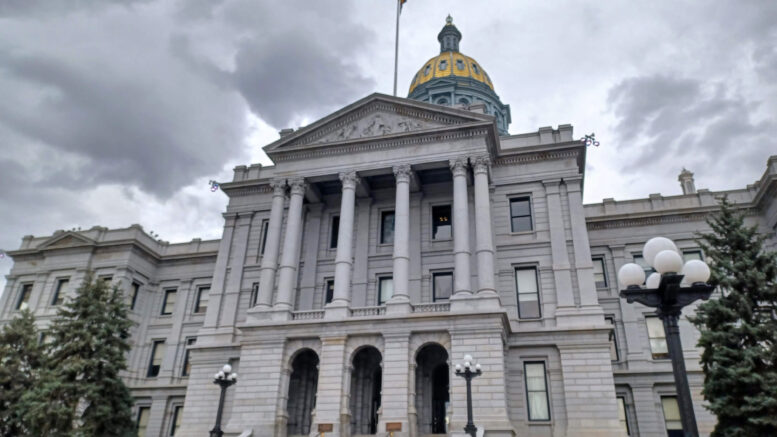Gov. Jared Polis on Thursday announced that the Colorado Legislature will go into special session next week to try to craft an alternative property-tax-break plan in the wake of Prop HH’s failure Tuesday, but it’s unclear whether commercial properties will get any help.
The Democratic governor issued an executive order for the session to begin at 9 a.m. on Friday, Nov. 17, lasting through the weekend before Thanksgiving and calling for legislators to produce a package “to reduce Coloradans’ property tax burden in 2023.” Residential property values have risen between 40% and 50% in many counties, and while commercial property valuations have gone up less than that in some urban areas, they largely are on the rise too at a time when vacancy rates in office buildings have spiked.
Polis and legislative Democrats hoped to address this problem through Prop HH, a ballot measure that would have reduced property values, lowered assessment rates and set soft caps on future valuation hikes in exchange for lifting the state’s Taxpayer’s Bill of Rights revenue cap. A full 59% of voters rejected the proposal during Tuesday’s election, however, leaving ruling Democrats with the choice of allowing the spike in property-tax bills or of going back into session to come up with a new solution, as Republicans have asked to do since May.
What the special session will address
Polis’ executive order — which he pulled out of a fire-extinguisher-fashioned case after smashing protective glass that said it was to be broken in case of Prop HH’s failure — does not prescribe a specific solution for legislators. It does, however, designate seven subjects for consideration, action and funding, which are likely to form the core of any new law.

Gov. Jared Polis, wearing safety goggles, breaks a pane of glass to pull out a special-session order at the start of a news conference on Thursday.
In addition to seeking to cut property-tax burdens for 2023, the governor’s order asks legislators to offset revenue reductions of any tax breaks to local governments, consider necessary administrative changes and investigate a process to create long-term property-tax relief. It also asks legislators to consider how to distribute TABOR refunds for 2023 (as a companion bill to cut equal-sized checks to all residents only would have gone into effect had Prop HH passed), consider new rental assistance and consider adjustments to the Earned Income Tax Credit.
What comes out of the special session will reflect why legislators believe that voters rejected Prop HH, and there seemed to be two schools of thought on that following Tuesday’s thumping. Republicans said voters did not believe they needed to give up TABOR refunds to get property-tax breaks, while some Democrats posted on social media that voters wanted them to focus on helping lower- and middle-income Coloradans rather than giving across-the-board tax breaks.
A current focus on homes, not commercial properties
And to that end, it remains unclear whether legislators will be willing to consider offering breaks for non-residential properties, as Prop HH would have done. Non-residential property-value assessments, which sit at a reduced 27.9% assessment rate this year but return to 29% in 2024, would have declined gradually to 26.9% by 2030 and been cut by an extra $30,000 just for this year — a 2023 reduction estimated between $34 and $503 per $1 million in value.
Polis’ order specifically defines the first purpose and need for the special session as “residential property tax relief,” and the executive order mentions property owned by homeowners and businesses together only when it discusses the need for long-term tax relief. Meanwhile, a statement issued by Democratic legislative leaders on Thursday repeatedly cites the need to help lower-income homeowners and renters but doesn’t mention non-residential property.
“Taxpayers are facing higher property tax bills not just this year but in future years, and these are immediate, statewide concerns,” Polis wrote in his executive order. “Increased property taxes make it harder for Coloradans to stay in their homes, build wealth and save for the future. Increasing property taxes not only impacts homeowners but also renters that bear the burden of increased costs on landlords.”
Building owners don’t want to be forgotten
Caitlin Quander — president of commercial-property owners’ group NAIOP Colorado, which remained neutral on Prop HH because the help it offered to businesses was offset by potential drawbacks — said she hopes that legislators remember that commercial building owners are suffering now too. Most are facing significantly rising tax bills whose increases likely will be passed along to business tenants through triple-net leases, and an increasing number of buildings in places like downtown Denver are falling into bankruptcy as vacancy rates average 30% while more employers move to hybrid schedules or eschew urban areas, she said.
“The messaging here seems to be to soften the impact on single-family homes but doesn’t necessarily impact the health of commercial property,” Quander said of the executive order, adding that non-residential property owners will ask for help before the Nov. 17 session launch. “Because commercial properties don’t vote, they’re kind of easy to leave out of relief talks … But if there is relief to be considered, it should be considered in an equal way.”
Looming over the session as well will be the specter of Initiative 50, a measure crafted by fiscally conservative group Advance Colorado that would cap annual property-tax increases at 4% unless voters agree to let the government keep more revenue. In a statement on Thursday, Advance Colorado President Michael Fields said he hopes to see legislators enact a “very significant rollback in property-tax rates” and then put into place an enforceable cap on future tax-revenue growth.
